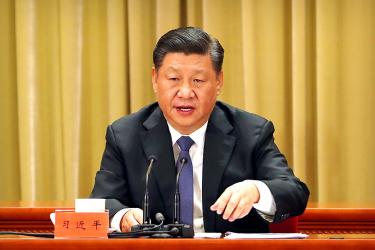Chinese President Xi Jinping (習近平) yesterday said he would not renounce the use of force against foreign forces and pro-Taiwan independence “separatists” that interfere with China’s goal of peaceful unification as he announced plans to explore using the “one country, two systems” model with Taiwan.
Xi made the remarks in a closely watched speech in Beijing marking the 40th anniversary of the 1979 “Message to Compatriots in Taiwan,” which called for the unification of “China,” an end to military confrontation across the Taiwan Strait and expanded cross-strait interactions.
“The history of the development of cross-strait relations has proven that no individual or force can change the historical and de jure sense of facts that Taiwan is a part of China and that both sides of the Taiwan Strait belong to the same ‘China,’” Xi said.
“The motherland must and will be reunited,” he said, before listing five points for the promotion of peaceful development of cross-strait ties and peaceful unification.
Taiwan and China must join hands to facilitate the reinvigoration of the Zhonghua minzu (中華民族, “Chinese ethnic group”) and realize the goal of peaceful unification, Xi said, adding that the continued separation of the two sides is a historical trauma suffered by the Zhonghua minzu as a whole, whose revival would help solve the “Taiwan problem.”
Xi said that he plans to explore a Taiwanese version of the “one country, two systems” framework, which would ensure that Taiwanese’s social system, way of life, personal property, religious beliefs and legal rights are fully respected and protected.
“The differences in [both sides’ political] systems is not an impediment to unification, nor should it be an excuse for separation,” Xi said, adding that the implementation of the “one country, two systems” framework to Taiwan would consider the nation’s situation and suggestions from various sectors of society on both sides of the Taiwan Strait.
China implemented the “one country, two systems” model in Hong Kong after the territory’s return to China in 1997, but pro-democracy Hong Kongers have accused Beijing of failing to honor its pledge of allowing the territory a high degree of autonomy.
Xi said that although his government is willing to do its utmost to achieve unification through peaceful means, “we make no promise to abandon the use of force and reserve all methods necessary” to realize that goal.
He said non-peaceful means would only target external forces that resist, and the “extremely few pro-Taiwan independence separatists” and their movements.
Xi added: “We are not targeting our compatriots in Taiwan.”
Xi said that on the basis of the “one China” principle, he is willing to engage in dialogue and communication on unification and cross-strait political issues with all political parties, groups and individuals from Taiwan to move both sides of the Strait toward political negotiations.
In his speech, Xi mentioned the so-called “1992 consensus” twice and included “national unification” as part of his definition of the “consensus.”
“Over the past 70 years, we have adhered to the spirit of seeking common ground while shelving differences, promoting the ‘1992 consensus’ reached by both sides on the ‘one China’ principle that espouses that ‘both sides of the Strait belong to one China and will work jointly to seek national unification,’” Xi said.
Source: Taipei Times - 2019/01/03





















